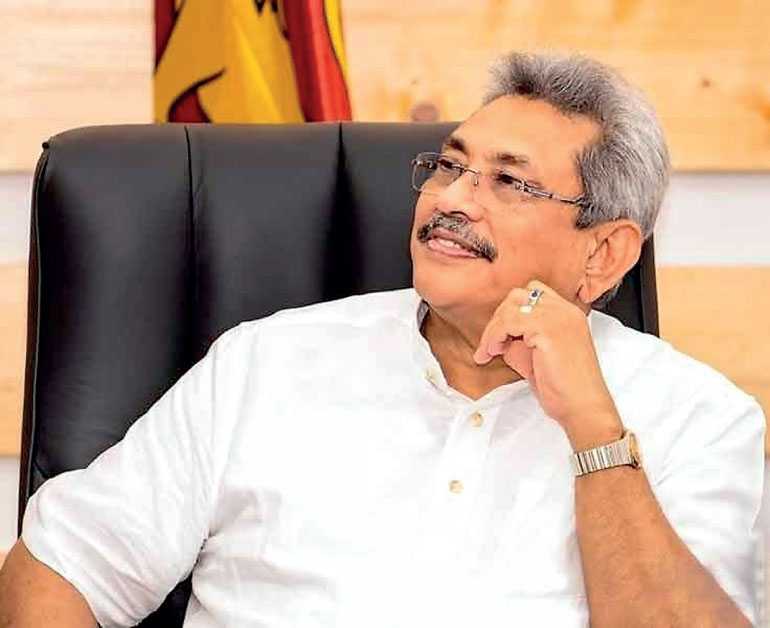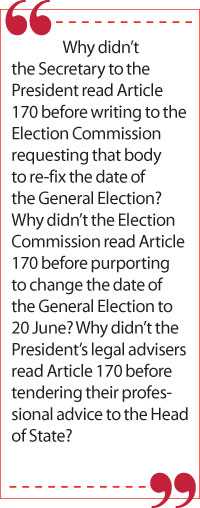Sunday Feb 15, 2026
Sunday Feb 15, 2026
Wednesday, 13 May 2020 00:00 - - {{hitsCtrl.values.hits}}

President Gotabaya Rajapaksa
On 2 March, the President, in the exercise of his powers under Article 70 of the Constitution, issued a Proclamation dissolving Parliament. He chose to do so six months before the term of Parliament was due to end, and four days after the World Health Organization had described the novel coronavirus as “a public health emergency of international concern”.
As required by Article 70(5) of the Constitution, the President in his Proclamation fixed 25 April as the date of the General Election and 14 May as the date of the first meeting of the new Parliament. That Article requires the President to summon the new Parliament to meet on a date not later than three months after the date of the Proclamation.
Indeed, whether Parliament is dissolved on a date of the President’s choosing, or at any time at the request of two-third of the membership of Parliament, or whether Parliament is dissolved by operation of law at the end of its lawful term, the Constitution requires the new Parliament to meet within three months of the dissolution.
As required by the Parliamentary Elections Act, between 16 and 22 March, nomination papers were received by returning officers appointed by the Election Commission. Meanwhile, on 11 March the World Health Organization proclaimed COVID-19 as a “pandemic”, i.e. a global spread of a new disease.
On 20 March 2020, a 24-hour island-wide curfew was imposed by the Government. At or about that time, obviously influenced by these events, the Election Commission was reported to have written to the President stating that it was unable to conduct the General Election on the date specified by the President in his Proclamation, and requesting the President to seek the advice of the Supreme Court on how to proceed in the matter.
It has also been reported that the Secretary to the President replied that it was the responsibility of the Election Commission to fix a new date for the General Election and that, therefore, the question of a reference to the Supreme Court did not arise. It was subsequently announced that the Election Commission had re-fixed the General Election for 20 June.
Serious issues of constitutional law
There are many issues of constitutional law of profound consequence that arise from the failure of the Election Commission to conduct the General Election on 25 April, and from its intention to do so on 20 June.
1. One is the period of validity of the Proclamation of 2 March 2020 made by the President under Article 70(5). That Article requires the General Election to be held, and the new Parliament to meet “on a date not later than three months after the date of such Proclamation”. Since the General Election has not yet been conducted, it is impossible for the new Parliament to meet on 14 May, or indeed on any date prior to 2 June. What is the status of a Proclamation that has not been implemented? Does it lapse or expire, thereby reviving the Parliament it sought to dissolve?
2. Another is the validity of the new date for the General Election fixed by the Election Commission. When the Constitution explicitly vests only in the President the power to fix a date for the General Election, and requires him to do so in the Proclamation dissolving Parliament, by what authority has the Election Commission purported to usurp, or arrogate to itself, that power? A letter from the Secretary to the President is hardly a substitute for the Constitution.
3. A third arises from the failure of the President to “amend, vary, rescind or revoke” the Proclamation issued by him on 2 March by exercising the power granted to him by section 18 of the Interpretation Ordinance, when it became apparent that the General Election could not be held on 25 April. It was his duty to fix another date for the General Election, having regard to the progress being made under his direction to contain the spread of COVID-19. If the procedures could not be completed within the three-month period stipulated in Article 70(5) of the Constitution, it was surely his duty to revoke the Proclamation and make a fresh Proclamation reflecting the realities of the current situation.
4. Yet another issue arises from the continued functioning of the Cabinet of Ministers. Under the Constitution, only Members of Parliament may be appointed to the Cabinet. Accordingly, provision has been made in the Constitution for Cabinet Ministers (but not non-Cabinet Ministers or Deputy Ministers) to continue in office for a limited period, notwithstanding that they are no longer Members of Parliament. Article 47 states that “The Cabinet of Ministers functioning immediately prior to the dissolution of Parliament shall, notwithstanding such dissolution, continue to function and shall cease to function upon the conclusion of the General Election”.
“Conclusion of the General Election”
When does the “conclusion of the General Election” occur? In the answer to that question lies the answer to all the issues raised above.
It is only upon the “conclusion of the General Election” that a new government is formed, that a new Cabinet of Ministers appointed, and when a new Parliament can meet. All these steps are required to be completed, as stipulated in Article 70(5), “not later than three months after the date of such Proclamation”.
Article 170
Chapter XXII of the Constitution is titled “Interpretation”. It has only one Article: 170. In that Article 170, the phrase “conclusion of the General Election” is defined in the following terms: “In the Constitution, “conclusion of the General Election” means the time at which Members of Parliament for all the electoral districts in respect of which a poll has been taken on the date or dates specified in the Proclamation made under Article 70(5) have been declared elected by the respective returning officers, or when on the results declared more than half the total membership of Parliament consists of Members belonging to any recognised political party or independent group, whichever event occurs earlier”.
Therefore, it is only on the date fixed in the Proclamation made by the President under Article 70(5) for the election of Members of Parliament (or on an amended date fixed by the President), that the General Election can take place. No other authority, whether it be the Election Commission or any other body, has the authority to fix or alter such date. Under Article 170, the “conclusion of the General Election” occurs only when the results are announced following a poll that has “been taken on the date or dates specified in the Proclamation made by the President under Article 70(5).
The General Election that is proposed to be held on 20 June 2020, on the authority of an Order issued by the Election Commission, will not be a “poll taken on the date or dates specified in the Proclamation made under Article 70(5)” and will therefore not be a valid poll within the meaning of Article 170 of the Constitution.
Why didn’t the Secretary to the President read Article 170 before writing to the Election Commission requesting that body to re-fix the date of the General Election?
Why didn’t the Election Commission read Article 170 before purporting to change the date of the General Election to 20 June?
Why didn’t the President’s legal advisers read Article 170 before tendering their professional advice to the Head of State?